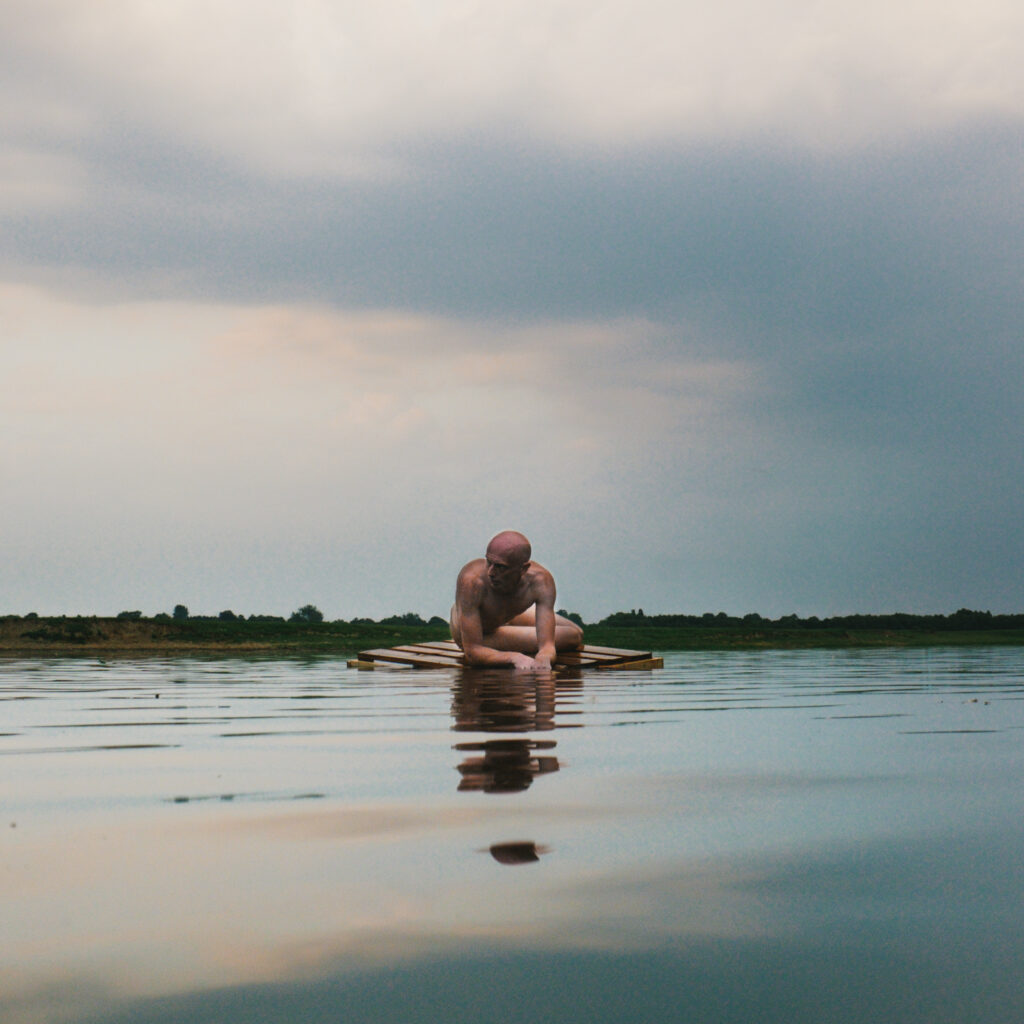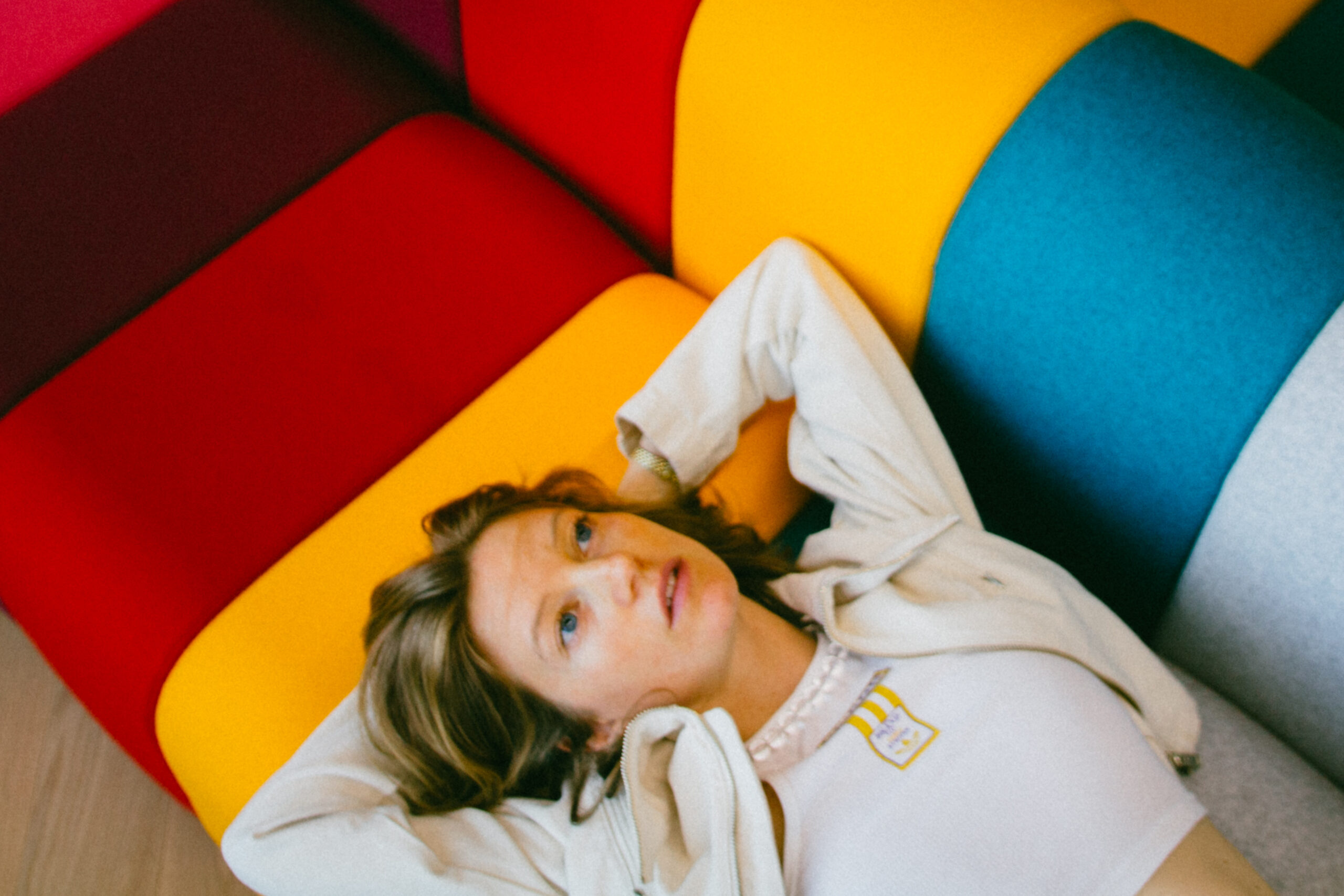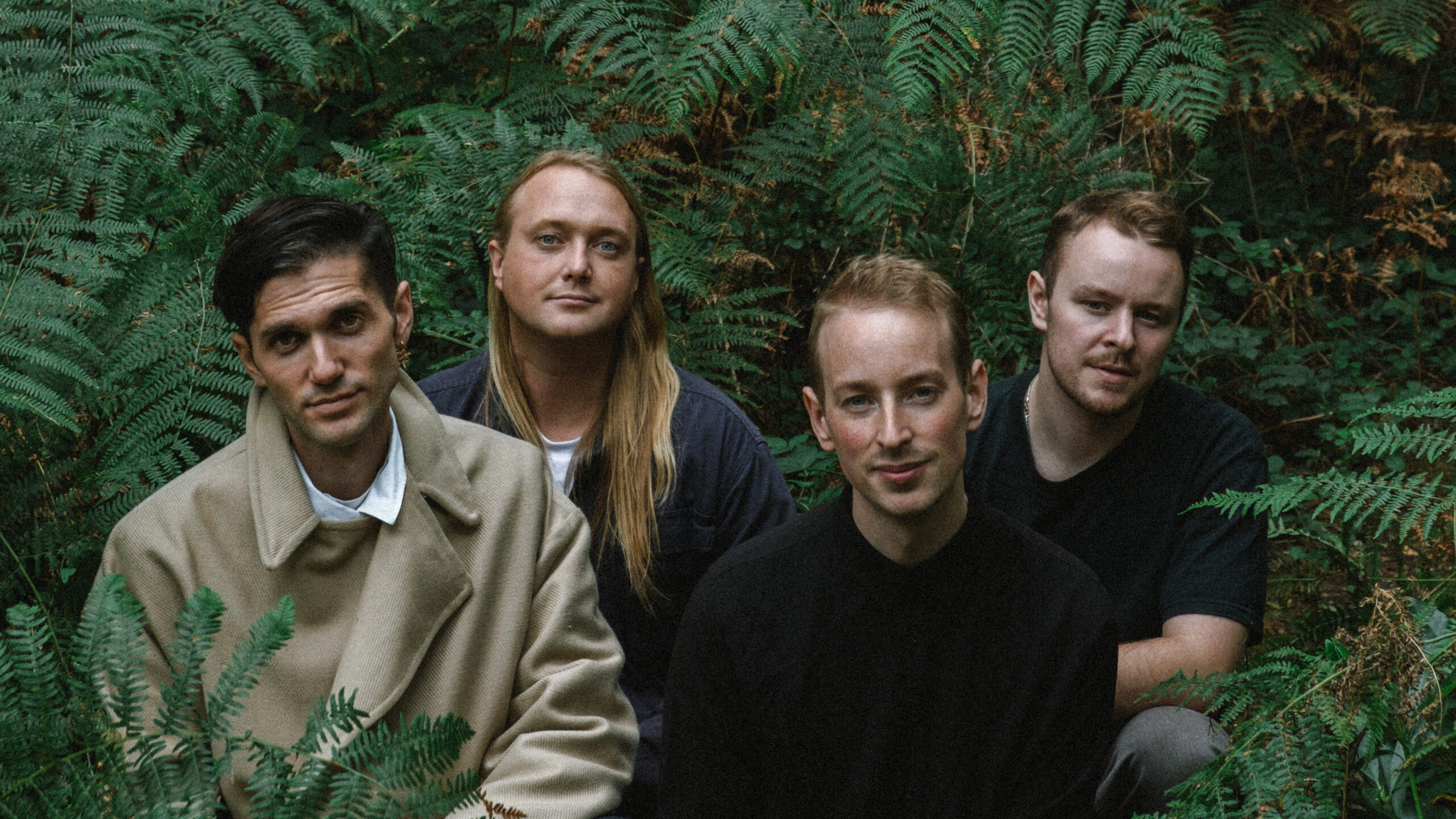Mit Anfang 20 liegt einem die Welt zu Füßen und alle Türen stehen einem offen – man ist aus den Kinderschuhen herausgewachsen, steht zum ersten Mal halbwegs auf eigenen Füßen, trifft die ersten eigenen Entscheidungen mit tieferen Einschnitten, fühlt alles so viel mehr als zuvor oder danach. Kein Wunder, dass die Oxforder Band Low Island dem Verlust dieser Jahre ein ganzes Album, genauer ihr komplettes Debütalbum If You Could Have It All Again, das letzte Woche erschienen ist, gewidmet hat. Und umso mehr, da die 20iger von Sänger und Multi-Instrumentalist Carlos Posada, Produzent Jamie Jay, Bassist Jacob Lively und Jazz-Schlagzeuger Felix Higginbottom anscheinend geprägt waren von der Indie-Hoch-Zeit von Bands wie den Klaxons, von LCD Soundsystem, Caribou, Radiohead oder den Foals. Wie wäre es also das alles wieder zu haben?
Kurz bevor das Debütalbum der Oxforder erschien, trafen wir Frontmann Carlos Posada zum launigen Zoom-Call. Die Pandemie ist allgegenwertig, weshalb auch die Band, die sonst jeden Tag zusammen im Studio verbringt, sich seit Wochen und Monaten nicht mehr gesehen hat. Einer ist im Norden von London, einer in Frankreich, einer in Oxford und einer in East London, das Album haben sie am ersten Tag des harten Lockdown in Frankreich soweit eingespielt, nur Carlos musste noch mal zuhause den Gesang alleine aufzeichnen. Gemixt wurde dann an verschiedenen Orten, auf Zuruf sozusagen. „Everything happens on the screen, there is no touring, when we do interviews it’s on Zoom, I’m not with my band mates. So you have to create this illusion that there is this emotional campaign, but I’m just sitting at home in my basement in London.“

Etwa vor vier Jahren hat sich die Band zusammengefunden, nachdem die vorherige Band von Carlos und Jamie in die Brüche gegangen war – obwohl sich alle Mitglieder schon seit Kindestagen kennen und auch schon in diversen Projekten zusammen gearbeitet hatten: „And then about 4 years ago, we were in a band, the singer left that band and we were like: ‚What are we going to do now?‘ And I started singing, with Jamie and then we started: ‚OK, we have some of this Jazz influence here, some of the dance influence here, some of the indie band influence there and there is a shared interest about Radiohead, Caribou, LCD Soundsystem – let’s give this one a go!’…and here we are 4-5 years later, finally about to release the first record. It took a long time to really get something which felt is a good home for us and all our musical interests.“
Wie ihre Band klingen sollte definierte sich durch ihre musikalischen Vorlieben, die man Trail-&-Error-mäßig in Versatzstücken zusammen zu puzzeln versuchte – auf der Spielwiese des EP-Formats: „Throwing things at the wall and see what sticks, that’s also why the first couple of EPs are stylistically very different. It was still exploring.“ Während man Sound-mäßig viel bei Radiohead und Caribou an Inspiration fand: „About the sound, we were trying to make electronic music sound human and sound relatable. That’s why we love Caribou and Radiohead so much, because they manipulate electronic sounds so they sound like they have faults and are made by humans.“

Doch irgendwann war es denn auch wichtig das Projekt Debütalbum anzugehen und sich auch auf einen Sound und eine Ästhetik festzulegen – oder wie sich Carlos erinnert: „It’s a weird thing, that you’ve always been told as a band in the music industry: no one really gives shit about you, until you make a record. So I think we were like: we can’t go on putting out EPs, if we wanna try and move our career forward it’s seems like we gotta do a record. I don’t know wether how true that it.“ So hat das Album-Format immer noch große Relevanz in der Musik-Industrie, auch wenn immer mehr junge Künstler sich darum drücken, indem sie sich mit EPs oder Singles stetig und schrittweiße ihren eigenen Hype und Wirkungsraum erspielen. „I think that’s the weird thing: the album existence is very weird space now, like it’s relevant for the music industry, but it’s less relevant for the listener in a way. And the way how streaming works now, you have to release so much music like all the time, that the album format feels a little bit weird for streaming.“
Carlos wirkt super reflektiert, charismatisch und voller kluger Gedanken – über die aktuelle Situation allgemein, aber auch über ihre Situation als Newcomer-Band, inmitten der Pandemie, inmitten des Brexit – was auch nicht verwundert, wenn man weiß, dass die Band sich selbst managet und auch ihr eigenes Label für ihre Veröffentlichungen führt. Ob es überhaupt aktuell noch möglich ist als Musiker nicht politisch zu sein, beantwortet er wie folgt: „No and if you think so you are a fool….There is 3 challenges at the moment: first of all – the economic of music streaming and how does streaming actually pay the artists. Second of all: pandemic! What is going to happen after the pandemic, how many venues are going to close, how many festivals – and what will that do to the lower tier for artists. Will artists still have places to play. In Oxford the last remaining venue in the center might close. That literately leaves no small capacity venue pretty much to play in Oxford. So where do young bands go? And then yes – the third challenge: if you are a European band or if you are from the UK – Brexit! At what point do you need a visa and what paperwork do you need, how quickly is the turnaround point of that and how easy will you be to move between borders. So if you are not thinking about those problems, then what the fuck are you doing? You know, it’s so challenge to be a new artist right now. It’s crazy actually.“
Spotify, erklärt er weiter, hat natürlich nicht nur die Rezeption der Hörer komplett verändert, sondern auch die Herausforderung für Künstler und Bands beim Schreiben von Alben. Denn während man früher mit dem Kauf eines Albums eine Transaktion mit einem Fan hatte, braucht man jetzt unzählige Transaktionen in Form von Streams um nur einen Bruchteil der Kosten für die Produktion des Albums wieder reinzuspielen…oder sogar noch etwas zu verdienen. Trotzdem muss man diese Aspekte beim Schreiben ausblenden: „As Brian from Radiohead says, art comes first and the commerce follows“, was sich dann in Low Island-Sprache wie folgt anhört: „I tried as hard as I can, to say, the music and the art comes first and then the we deal with the other crap later, but you know, it’s difficult“ Weiter sagt er: „I still don’t really understand how you make a living from being in music, I still don’t get it and I don’t know how it happens.“

Um ihn persönlich war es mit dem Berufswunsch schon mit 10 Jahren geschehen, als er im Haus eines Freundes eine Woodstock-DVD gezeigt bekam: „That’s when I was really, like ‘Oh WOW’. I specifically remember Hendrix, but loads of other stuff. I think at that point I decided that I wanted to get a guitar and be in a band. When I was 11 I formed a band with the bass player in this band, I can’t remember the name of the band, but we made rubbish music. I think he was the bass player but he didn’t even had a bass. So this goes back a very, very long way…“ Nach dem Ausstieg des Sängers wurde Carlos kurzerhand, obwohl er zuvor in all den Bands nicht mehr als Hintergrund-Gesang übernommen hatte, kurzerhand Frontmann. „I think it has been a real learning curve, on so many levels. Like: Learning how to sing took me a very long time, still learning a lot, you know, it’s only 4-5 years and a lot of singers are doing this since they are 8 years old or so. So I’m still learning a lot about that. I still hate being filmed while singing, because I get so nervous, like if I’m going to fuck it up. On the lyrical side I find it quite liberating to be in the situation to have some kind of an outlet for things that I felt or believed in, which I didn’t have before when I was in bands and just played guitar at the side….and in a way it’s also about finding out which kind of frontman you are. Everyone has different ways of doing that. And I think we are still working all of these things out.“ Mit einem gewichtigen Rock’n-Roll-Mythos räumt er dann auch gleich in diesem Zuge auf: „Apprently smoking and drinking is not so good, when you are singing…and you have to be physically more fit then you have been before, especially when you are on tour.“
Also keine Exzesse auf Tour, kein Rauchen und keine wilden Partys – da passt es, dass auch die Songs inhaltlich einen erwachsenen Anstrich haben, bei wilden treibendem musikalischen Unterbau, bei denen immer wieder auch die Vorbilder durchscheinen. Den Song What The Hell erklärt Carlos inhaltlich wie folgt: „I think there is this feeling when you are in your early twenties and you start being in a band or being an artists and it feels like this pretty brave thing to do and all of your friends are doing other jobs and you think you being brave and pursuing this thing…and then you get to your later twenties and you’re like: ‚Maybe this is a fucking stupid idea“ and everyone is starting to getting their lives together. And there is defiantly a feeling of the society telling you: ‚Come on, don’t be stupid, get in line’ – and I think that song ist articulating that moment of getting that feeling, maybe I need to pursue something that’s a bit more conventional and feel more security. Not necessarily because I want it but because I don’t see other alternatives.“
I Do It For You hingegen hört sich nach mehr jugendlichem Sturm & Drang an: „There are funny sides to the record, sometimes it’s easy to forget or sometimes I forget, but there is humor in it. It is about pursuing love, almost more then pursuing a meaningful relationship to a person, like the idea of love, rather then really having a meaningful connection with someone. And then suddenly feeling like: Shit, we have nothing in common…and this is actually a real moment as well, that actually happened, I was in the concert in the UK, it was at a LCD concert. And it’s also a reflection of the hollow ways in which we date sometimes, especially online.“
Man gönnt dieser Band eine große Karriere und uns allen diese rhythmischen, vielschichtigen Songs live sehen zu können, am liebsten Mitten im Moshpit, in einem Pulk nicht so socially distanzierten Menschen, selbst der Schweiß und die Nähe der anderen Menschen würde einen nicht stören gerade…und da wären wir wieder bei der Trauer zu den vermeintlich verlorenen Zwanzigern. Für grob 40 Minuten kann man diese in 11 Songs auf dem Debüt von Low Islands zumindest gedanklich wieder beleben.










